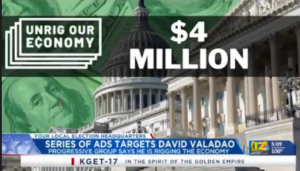Progressive Campaign Spending Seven Figures on Ads in 22nd Congressional District

BAKERSFIELD, Calif. (KGET) — With soaring inflation under Democratic control of the White House and Congress, the party is largely playing defense when it comes to the economy this midterm election.
One group is spending seven figures in the Central Valley in an attempt to flip the economic woes on the GOP.
In a series of new ads ahead of November’s General Election, progressive campaign Unrig Our Economy is targeting four ultra-competitive Congressional districts around the country, including the Central Valley’s own 22nd district race.
“It’s really a purple district,” Unrig Our Economy Central Valley campaign spokeswoman Alice Walton said. “And when there is a competitive seat, we found that is typically a good time to really force candidates to talk about issues.”
Walton says the group isn’t associated with a particular candidate, but the ads are clear on who they are targeting.
“But when Congressman Valadao has had the chance to do what’s best for working people, he hasn’t done it,” one ad says.
“Instead of messaging bills to give these Democrat groups the opportunity to just beat up people on TV, maybe they should actually focus on solving some problems,” Valadao said.
The newest ads feature residents in the district and specifically point to two of Valadao’s votes in Washington, H.R. 1 in the 115th session of Congress, known as the Tax Cut and Jobs Act of 2017, and H.R. 6833, known as the Affordable Insulin Now Act.
“He voted for a $1.9 trillion tax break for corporations” one ad says referring to Valadao.
“It was an easy vote, because it actually put more money in the pockets of people that desperately needed it,” Valadao said.
Valadao argues H.R. 1 was a tax break for the majority of his district and encouraged investment in small businesses. According to the non-profit Tax foundation, the average annual income tax cut in his district was $1,146.
But Walton says the cut disproportionately benefits the wealthy. “The reality is the top 5% of income earners benefit the most from the cuts,” Walton said, also noting Valadao voted against the Build Back Better Act which included some specific tax credits for lower earners.
When it comes to the Affordable Insulin Act, which sought to lower insulin prices and cap monthly co-pays, Unrig Our Economy says Valadao’s no vote kept medicine prices high.
Valadao argues the bill did nothing to control the cost of manufacturing and encouraged companies to look oversees for cheap product. “If we’re going to help lower the cost of these things, we’ve got to make sure that we also encourage ways to find cheaper product negotiations,” Valadao said.
This story originally appeared on KGET.
